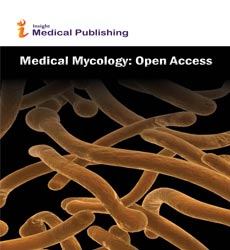Abstract
Morpho-Molecular Characterization and Virulence Determination of Entomopathogenic Fungal Isolates Native to Indian Subcontinent
Background: The house fly, Musca domestica L. is a major pest of medical and veterinary significance which due to their ubiquitous lifestyle and broad food preference achieves a very high density in favorable climatic conditions of Indian subcontinent. This has led to several instances of severe health condition among human and animal population, calling attention towards M. domestica control through existing and innovative methods. Use of biological control agent, such as entomopathogenic fungi (ENPF) for M. domestica control has shown potential, and need to be further explored for the newer isolates suited to particular environment for greater efficacy. The present study attempted the isolation and identification of native ENPF strains suitable for M. domestica control. Method and findings: Five strains of ENPF were isolated from soil samples, which on preliminary identification of morphological, microscopic and spore attributes were determined to be isolates of Beauveria species. The isolates showed wide variation in pathogenicity against M. domestica, with 72.7%-100% and 36.7%-72.3% mortality against adults and larvae life stage, respectively. Isolate ‘1’ depicting maximum insecticidal activity against M. domestica was selected for molecular identification using 18s-rRNA, and found to be Beauveria bassia HQ917687. The molecular analysis using random amplified polymorphic DNA (RAPD) showed isolate ‘2’ to be most similar to isolate ‘3’, while isolate ‘1’ and ‘5’ showed maximum variation between them. RAPD result was in conformity with various other properties of isolates; such as biomass, spore yield, hydrophobicity and insecticidal activity. Conclusion: The variations in activity obtained through pathogenicity assessment of fungal isolates in this study reflected the strain diversity of Beauveria isolates. The results also signified the importance of strain selection for effective control measures as well as for further consideration of commercial aspects.
Author(s):
Sapna Mishra, Peeyush Kumar and Anushree Malik
Abstract | Full-Text | PDF
Share this

Google scholar citation report
Citations : 164
Medical Mycology: Open Access received 164 citations as per google scholar report
Abstracted/Indexed in
- Google Scholar
- China National Knowledge Infrastructure (CNKI)
- Directory of Research Journal Indexing (DRJI)
- WorldCat
- Publons
- Geneva Foundation for Medical Education and Research
- Secret Search Engine Labs
Open Access Journals
- Aquaculture & Veterinary Science
- Chemistry & Chemical Sciences
- Clinical Sciences
- Engineering
- General Science
- Genetics & Molecular Biology
- Health Care & Nursing
- Immunology & Microbiology
- Materials Science
- Mathematics & Physics
- Medical Sciences
- Neurology & Psychiatry
- Oncology & Cancer Science
- Pharmaceutical Sciences
